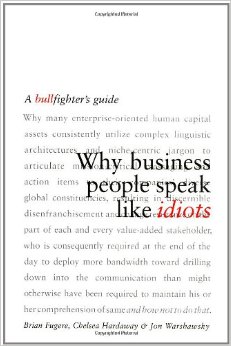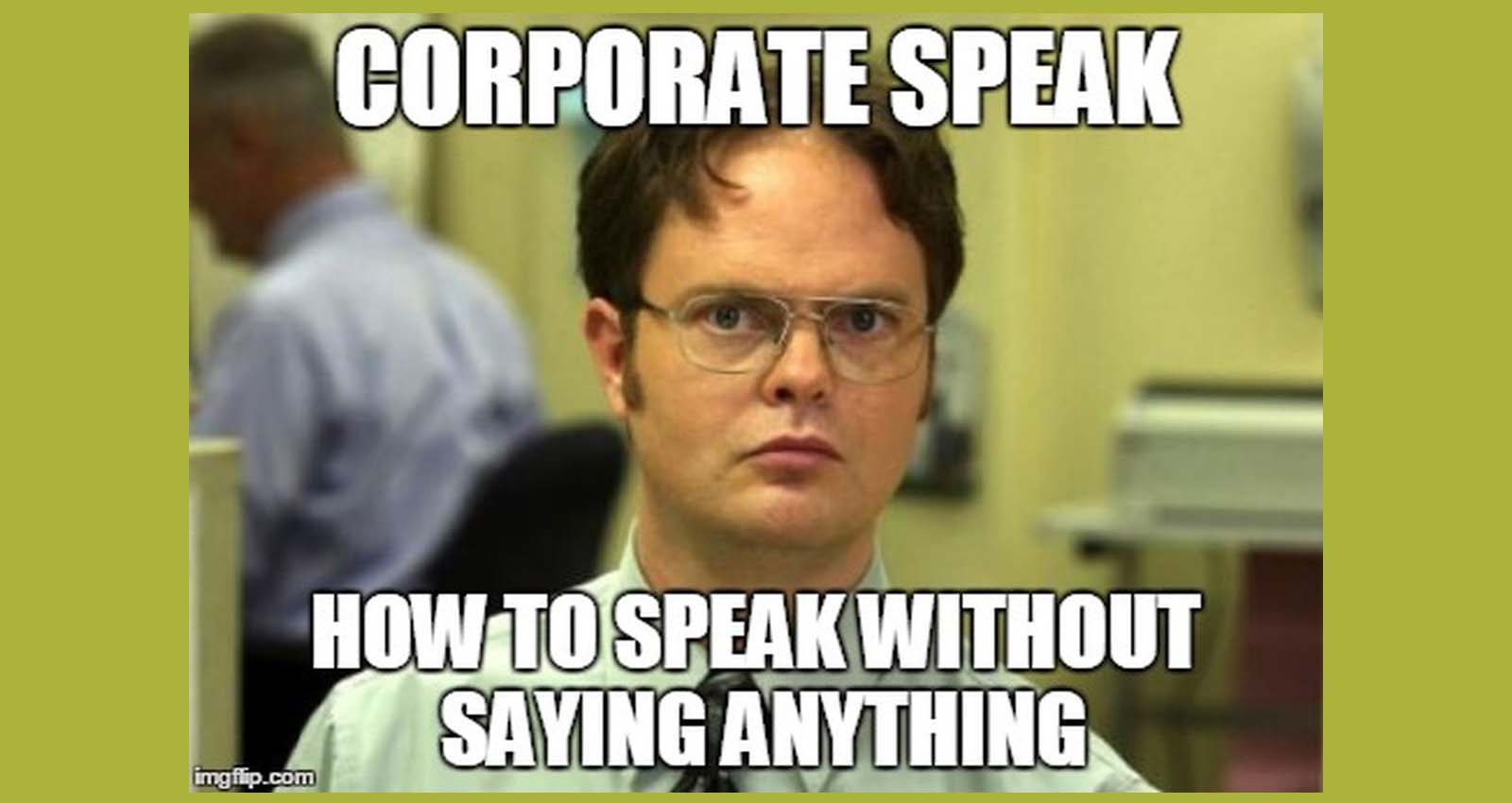I was recently involved in a large 1-day employee engagement process. After they had all poured their hearts and souls into crafting recommendations and ideas for the company to implement, the CEO stood up and said:
“I am wholly committed to wanting to move this forward!”
Huh?? What does that mean? So what exactly are you wholly committed to? To wanting? Or to actually move this forward? And what exactly does it mean to “move this forward”?
It’s unlikely that he would speak this way with friends and family. Even if it was extremely important.
So why do we speak like weiners at work?
 According to writers Brian Fugere, Chelsea Hardaway and Jon Warshawsky (Why Business People Speak Like Idiots), the root cause is fear. Many businesspeople are afraid to be direct, forthright and to commit themselves to real action. They would much rather hide behind a smoke screen of half-truths, slogans, and “feel good” words than really tackle the problems at hand. After all, if you commit to something, then you might actually have to deliver.
According to writers Brian Fugere, Chelsea Hardaway and Jon Warshawsky (Why Business People Speak Like Idiots), the root cause is fear. Many businesspeople are afraid to be direct, forthright and to commit themselves to real action. They would much rather hide behind a smoke screen of half-truths, slogans, and “feel good” words than really tackle the problems at hand. After all, if you commit to something, then you might actually have to deliver.
Of course, our hapless presenter didn’t just learn how to speak and behave this way the moment he stepped up to the podium. It took some time soaking in the corporate culture to learn to string these saccharine sentences together. Through his indoctrination, he learned that:
- “Value proposition” means “Reason to buy”.
- “Take it offline”means “let’s talk about this later”.
- “Solution Matrix”is a way of making what’s normally a simple decision sound like it took a great deal of deliberation. (often accompanied by “key results areas”, “stakeholder focus” and “win-win paradigms”)
- “Initiate project action plan” means “start working”
 Some people use 2-dollar words to make a 2-bit point because they think simple language is the sign of a simple mind. “Let’s implement this on a go-forward basis” sounds more intelligent than “Let’s do this” — or so the theory goes. It actually has the opposite effect. Warshawsky says “Intelligent business people who are confident in their messages and passionate about their companies don’t need obscure language to communicate– which is why you never see Jeff Bezos, Amazon’s CEO, blathering in jargon.”
Some people use 2-dollar words to make a 2-bit point because they think simple language is the sign of a simple mind. “Let’s implement this on a go-forward basis” sounds more intelligent than “Let’s do this” — or so the theory goes. It actually has the opposite effect. Warshawsky says “Intelligent business people who are confident in their messages and passionate about their companies don’t need obscure language to communicate– which is why you never see Jeff Bezos, Amazon’s CEO, blathering in jargon.”
Although many people are great at impromptu corporatespeak, where they really shine is when it comes to prepared presentations and the written word. Powerpoints and annual reports are legendary for this transgression.
 I’ve seen it myself. While facilitating a recent strategic planning retreat for an oil rig service company, it became obvious that due to a recent hiring explosion, many newer attendees did not understand how their business worked. We decided that the VP needed to stand up and deliver an impromptu “education session”.
I’ve seen it myself. While facilitating a recent strategic planning retreat for an oil rig service company, it became obvious that due to a recent hiring explosion, many newer attendees did not understand how their business worked. We decided that the VP needed to stand up and deliver an impromptu “education session”.
He pulled out a marker, made for the front of the room and started explaining. Graphs and figures popped out of his head as he performed magic on the flipchart. It was unrehearsed, to the point, enthusiastic and full of good information. This turned out to be one of the favourite parts of the retreat.
As a result of this, on a subsequent retreat for another department, the leaders distilled this into a Powerpoint presentation (you can already see where I’m heading with this…) You guessed it… it was a big yawn. People glazed over and nodded off as the Powerpoint slides rolled on. The presentation had been “sanitized” and the humanity driven out of it.
To illustrate how even material intended for an external audience falls victim to this, here’s an example taken from the website of a major corporation.
“[Our] heritage of leadership spans the terms of nine chairmen, generations of employees and decades of business transformation. We have a history of firsts in technological innovations and in management practices that have influenced the way businesses grow and lead. And we are known for a performance culture that consistently delivers results. But these accomplishments alone will not ensure our leadership in the future. Leaders and companies that seek to continue to lead must perform with an unyielding integrity that earns the trust of our stakeholders – integrity in our relations with customers and suppliers; integrity in our disclosure to shareholders and creditors; integrity in our products; integrity in our relationships with our employees; integrity in our compliance with legal and financial rules; and integrity in our interactions with regulators, media and communities.”
OK, you can wake up now…
 That comes to us courtesy of General Electric chairman Jeff Immelt. (or, more likely, his spin doctors in public relations)
That comes to us courtesy of General Electric chairman Jeff Immelt. (or, more likely, his spin doctors in public relations)
If he were speaking at an intimate event of GE Managers, it might have sounded more like this:
“GE’s been around for quite a while and we’ve seen a lot. We’ve come up with a lot of new products and new ways to running a business that other organizations admire and strive for. And we’re known for keeping our promises. But that doesn’t mean we’ll always be on top. If we want to stay at the top, we have to keep on delivering. Recently we’ve seen the failure of several companies with questionable integrity. Our honesty, straight talk and fairness has helped make us industry leaders and this will continue to be the way we operate.”
Now, if you heard that delivered with intense passion and conviction, you’d be a convert wouldn’t you?
Though simple direct communication may feel a touch more risky (call in the appropriateness police!), it ultimately differentiates you from your peers, builds respect and moves you forward.
In the end, it seems it’s all an attempt to prevent our true personalities from bubbling over and, god forbid, “committing a career limiting move that will have us cubicled and then watercoolered about for a months” (doing something stupid that gets us demoted and gossiped about).
“committing a career limiting move that will have us cubicled and then watercoolered about for a months” (doing something stupid that gets us demoted and gossiped about).
So the next time you’re tempted to “interface” with a fellow employee to “frame” a “stretch goal” that “synergizes” with the company’s “vision”, give your head a shake and then say what you actually mean!
Good Luck!
Experienca offers synergistic experiences that optimize stakeholder capabilities and buy-in to facilitate the implementation of your corporate mission.
Translation:We provide training, team building and facilitation for staff, management and executives. You and your team will get more done with less effort, make better decisions, make more money and be happier!
So call us… Let’s “dialogue and synergize a solution matrix”.

